The impact of the cost-of-living crisis and surging energy prices are forcing holiday let owners to look at ways to save money, to cut the costs involved in running a holiday let. That’s why we’ve created a complete guide to our top money saving tips for second home owners.
Despite the surge in the UK’s staycation market, with a reported 57%* increase in bookings year on year (from 2020 to 2021), and the average income for owners up by 33%* in just two years (from 2020 to 2022), the average cost of running a holiday let will steadily rise to reflect the ever-increasing rate of inflation.
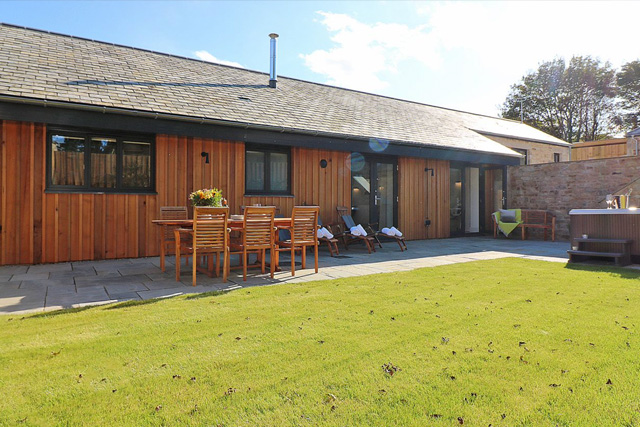
Top money-saving tips to cut holiday let costs
Read our complete blog with plenty of money saving tips, or use the quick links below to find out about a particular topic. You’ll be amazed at how making several smaller changes can add up to big annual savings.
Capitalise on your holiday let tax advantages
Paying tax on the income your holiday let generates can be a costly and complex process to understand. Not many owners realise that as a furnished holiday let, there are certain tax advantages that you can benefit from. Here are a few ways that you are able to capitalise on these and reduce your holiday let tax bill.
Holiday let deductible expenses
The advantage of letting as a furnished holiday let means the government considers you a commercial trading business. This means, for tax purposes, you have the ability to claim expenses relating to your holiday let business.
Furnished holiday let capital allowances – A sure way to save money and reduce your holiday lets tax bill is by claiming capital allowances. These include items like furniture, equipment and fixture which are used to improve your property. It even covers the cost of upgrading a kitchen for your holiday let. In addition to which, adequately fitting your holiday home with furnishings helps attract more guests, making it more profitable.
Allowable expenses for holiday lets – Another way to cut your tax bill is by off-setting as much of your allowable expenses against your rental income, especially with multiple costs expected to rise. These range from utility bills, maintenance and cleaning costs.
Making tax-advantaged pension contributions
Another great money saving tip is that any profits you earn from letting your holiday property can be used to make contributions towards your pension. If you choose to do this, your profits will be lower, which means you’ll be paying less income tax.
Capital Gains Tax Relief when selling your holiday let
If you own a property that you’ve let out as a business, you’ll be liable to pay tax on the amount that it’s increased in value. Fortunately, there are various forms of relief available that will save you money:
Entrepreneurs Relief – Also known as Business Asset Disposal Relief, where you can reduce the amount of Capital Gains Tax to 10% rather than a higher rate.
Business Asset rollover – If you use the proceeds of the sale of your property to buy a new holiday let, you may qualify to delay paying any Capital Gains Tax.
Gift Hold-Over Relief – Hold-Over Relief means you don’t have to pay tax you gift your holiday let or sell it for less than it is worth.
Claim Small Business Rates Relief
If your property is classed as a furnished holiday let by HMRC, you won’t need to pay council tax. Instead, you’ll be subject to business rates for holiday lets. Some properties are eligible for discounts from the local council and may be able to claim Small Business Rate Relief, which will reduce the amount of tax you will have to pay.
Holiday let mortgage interest rate relief
You can make significant savings by taking advantage of the holiday let mortgage interest rate relief. If you have borrowing costs to fund the purchase of the holiday let, the interest you pay can be offset in full against the letting profits. This tax benefit is one of the main reasons why investing in holiday lets, rather than long-term letting, has become increasingly popular recently. Read our blog for further holiday home mortgage advice.
How to qualify as a furnished holiday let
It is important to note that in order to qualify as a furnished holiday let, the property must meet the following criteria:
- It must be available to let commercially to the public for at least 210 days a year.
- It must be let as a self-catering rental for 105 days a year.
- It must not be in the same occupation for more than 31 days in more than 155 days of the year.
For an in depth look at whether you qualify as a furnished holiday let business and subsequently for money saving tax advantages, read our guide on holiday homes, tax and all things in between. The government also provides a dedicated guidance for furnished holiday lets.
How has the Spring 2024 Budget affected Furnished Holiday Lets?
On 6th March 2024, the Budget included an announcement that the Furnished Holiday Let tax regime would be removed from 1st April 2025. There will likely be a period of transition from that date. Technical guidance is due to be released shortly, which we’ll scrutinise alongside the legislation changes, and will update our information as soon as possible subsequently. As of April 2024, the tax regime mentioned in this blog is still in existence.
Make your holiday let energy efficient

One of the major overheads to running a holiday let are energy bills. With the pending energy price hike looming, the best way to ensure that your costs stay low is to become energy efficient.
Reducing the amount of energy guests use is not only a great way to lower your holiday let costs, but it also helps maintain a low carbon footprint – a key booking consideration for many customers.
Choose energy efficient appliances for your holiday let
Guests have come to expect a holiday property to be well-resourced and comfortable, with the usual amenities found in a home and more. However, appliances such as tumble dryers, washing machines and dishwasher are often very costly to run.
The energy rating of an appliance indicates how much energy a product uses, and how that compares to similar models. When choosing your holiday homes appliances, an A++ rating will save you the most money in the long run.
Install an energy saving smart thermostat
Heating is the biggest energy consumer in a holiday property. By introducing energy saving smart thermostats, you can prevent soaring bills whilst still providing guests with a warm and cosy property.
Smart thermostats that control hot water and radiators make a big impact. Features vary by product, but can include multi-room control, hot water control and geofencing to track when guests leave and enter your property.
Having a smart thermostat fitted in your holiday let allows you to control the heating from your mobile device remotely. No more worrying about guests leaving the heating on when they depart.
Switch to LED light bulbs
Where possible, replace traditional and halogen lightbulbs to energy-efficient light bulbs.
LED bulbs use up to 90% less energy than conventional halogen bulbs, providing the best value lighting solution, saving power and dramatically reducing your bills.
LED bulbs also boast a far longer lifespan, meaning you won’t have to spend money on replacing them frequently, and conversely, there is far less waste and impact on the environment.
Draught-proof and insulate your holiday let to save energy
Draught-proofing is one of the cheapest and most effective ways to save energy, cut costs in any holiday cottage, and keeps your holiday let warm for guests as well as remaining energy efficient.
To draught-proof your holiday let, you should fix unwanted gaps that let cold air in and warm air out. The great thing is that these can be easily remedied with rugs on floors, foam strips or brush strips for doors, and windows or draught excluders for chimneys. Saving warm air means less energy is used to heat the property, so you’ll save money as well as making your holiday cottage snug and comfortable.
Insulating your hot water cylinder and pipes is another simple way to keep energy bills low. As well as reducing heat loss from the system, effective insulation will also prevent pipes from getting too cold in winter, preventing them from bursting. For more helpful tips, head over to our blog on how to stop your pipes from freezing.
According to the Energy Saving Trust, a quarter of heat is lost through the roof of an uninsulated home. Adding insulation to a loft or attic is an effective way to reduce heat loss, lower your heating and reduce carbon emissions too.
Keep an eye on your energy bills
With the cost of living at its highest in a decade and your holiday lets utilities being one of the biggest expenses, it pays to understand and keep an eye on your energy bills. While now may not be the best time to switch energy providers, there are still other ways that you could keep your energy payments down. Sometimes just a few small changes will help save money, such as:
- Choose to go paperless and manage your account online. There are companies that charge extra for paper bills.
- Paying by direct debit is generally cheaper than waiting until you receive a bill. It’s also worth sending regular meter readings to keep your bill accurate.
- Ensure that you question any direct debit increase by your provider that seem too high.
Hot tub energy saving tips
Providing the luxury addition of a hot tub can increase your earning potential and drive bookings to your holiday property. Although a hot tub can be a costly item to run, there are many easy ways to reduce your hot tub running costs. These include:
- If you’ve not yet bought a hot tub, be sure to look for the most energy efficient brand. There are plenty of more energy efficient hot tubs that heat faster, maintain temperatures and keep the heat in better than others.
- One of the easiest ways to reduce your hot tub running costs is to get a thermal cover. This reduces heat loss and also helps to heat the water quicker, minimising the energy needed to maintain a specific temperature.
Reduce water waste at your holiday let
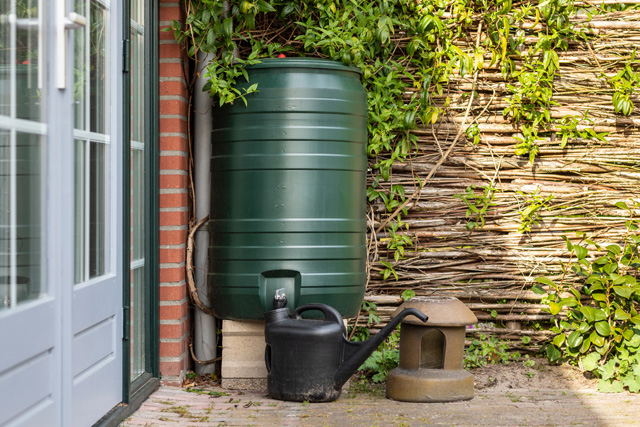
Reducing the amount of water consumption and waste at your holiday cottage not only improves the environmental sustainability of your holiday home but lowers the water charges.
Dual flush toilets
A dual flush toilet is specifically designed to conserve water by offering a choice of different flush volumes. A dual-flush means you only use the water you need.
Get a low-flow shower head and tap aerators
Conserve water by installing a flow restrictor on your shower. A water-efficient shower head can reduce water use by up to 40%. The less water your guests are using during a shower means the less electricity needed to heat it and the less energy you’ll be paying for.
Tap aerators separates the flowing water into tiny streams separated by air gaps. The mix of water and air means your guests won’t notice a reduction in water pressure, but the amount of water used is significantly reduced.
Install a water butt
A water butt gives you a ready supply of water for all your property’s gardening needs without having to rely on your main water supply. They are relatively inexpensive to buy and easy to install. It’s a simple way to harvest rainwater that would normally go to waste, reducing your consumption and water bills.
Generate renewable energy for your holiday let
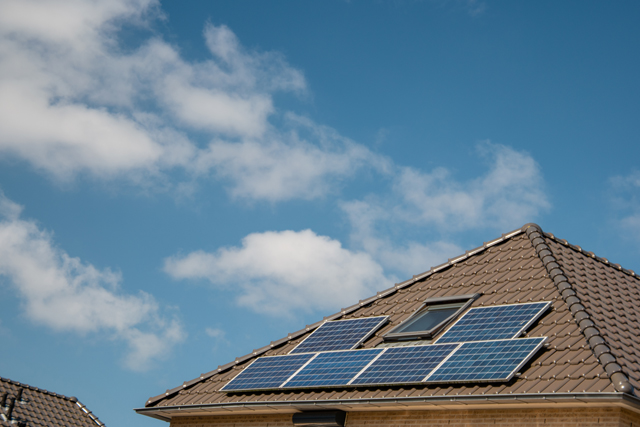
While the easiest way to reduce energy bills and save money is by cutting back on energy consumption, there are other alternatives. Utilising natural resources such sun, wind and water to generate renewable energy will not only reduce your need for power, but potentially remove your reliance on the national grid.
Producing your own energy means you’ll spend less on electricity and could see you receive money back for any additional energy you create. While initially the investment cost of generating renewable energy can be quite high, over time you’ll reap the financial reward.
The benefit of generating your own energy goes beyond that of just saving money but is environmentally sustainable and reduces your holiday lets carbon footprint, adding to the eco-credentials of your property.
Conduct regular holiday let maintenance
Holiday let maintenance is often time consuming and costly, but failing to keep on top of regular upkeep means issues can quickly escalate into more serious and costly problems. By keeping a close check on your property and conducting regular maintenance, for issues such as window draughts and leaky taps, reduces the risk of any long-term problems – all of which could turn into expensive repair or replacement costs.
Invest in quality products
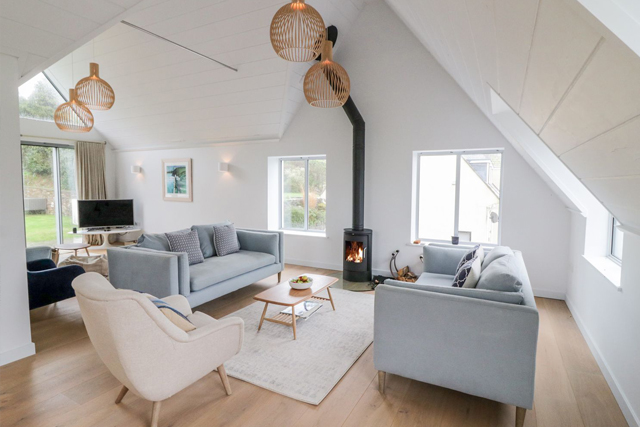
Your property is likely to see a fair amount of wear and tear throughout the season, so it pays to invest in quality furnishings that will keep your property well-presented.
It might seem like a great way to save costs at first, but opting for cheap furniture and appliances can be a false economy. You’re likely to have to replace items more often than better quality items, which could end up being more costly in the long run.
Another cost saving tips which could save you money in the long run is purchasing an extended warranty for appliances. Also, it’s usually easier and more cost-effective to replace rather than repair appliances. In addition to which, it will prevent the need for callouts, repair costs and minimises disruption to your guests holiday – a key factor in encouraging positive property reviews.
Encourage guests to be energy-aware
Many of us are already now in the habit of being energy-aware in our own homes, so encouraging guests to do the same in your holiday cottage could see small savings add up.
Use a holiday home guest information folder to provide a friendly suggestion on what they could do to help save energy.
- Suggest that guests use eco-mode on appliances such as dishwashers and washing machines. Using eco-mode means using less water and a lower temperature than most settings, and uses far less energy too.
- Ask guests to switch off appliances, aircon, heating and lights when they go out.
- Include a friendly reminder to guests to fill the kettle with only the required amount of water, which will save both energy and water.
Maximise your holiday let income to offset costs
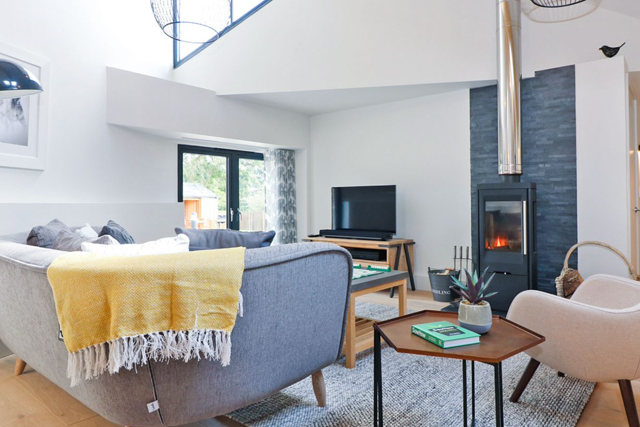
With the cost-of-living rising, what better way to cover the increase in bills than maximising your holiday let income? Here are our top money earning features to include in a holiday property:
- Add a hot tub – Adding a hot tub gives your property a distinguishing feature, which allows you to increase your rental rates, and in tern, boost your booking levels. According to the Sykes Holiday Letting Outlook Report, properties with hot tubs, compared to those that don’t, can earn 49%* in additional revenue.
- Open fire – Bookings for holiday lets with this feature are up 36%* compared to 2021 and provide an energy efficient way for guests to heat the property.
- Allowing pets – dog-friendly cottages can earn an additional 9%* in revenue. There are just a few adjustments that you may need to make in order to accommodate pets including beds and bowls, waste bags, and dog treats as an extra special gift. These small and relatively inexpensive items are often well received and can encourage positive reviews and repeat bookings, and the cost of which will soon be covered by the additional income.
- Accept short breaks – The days of week-long holidays, booked 12 months in advance, are long gone. Three or four night getaways have become the new normal, with around 44% of Brits preferring to book multiple staycations instead of one summer holiday abroad. Whilst there is a risk of taking a short break and then losing out on a week-long booking, a good agent will help you secure ample bookings to fill those gaps. And remember, whilst two bookings in place of a week-long stay may mean more work, it will invariably bring increased revenue also!
Enlist the help of a holiday let management company
With just a few simple changes to your holiday let, you could make signification savings.
Enlisting the help of a holiday let management company like Helpful Holidays, for expert advice and support, can make all the difference to saving money and reducing your holiday let costs. Particularly important if you don’t live within easy reach of your holiday let.
There are countless benefits of partnering with a team of industry experts who specialise in the self-catering holiday market, who are on-hand and committed to providing you with invaluable advice throughout your holiday letting journey, helping you to maximise your property’s earning potential and overall success.
We’re happy to answer any holiday letting queries you may have, so to find out more about letting with Helpful Holidays, request your FREE Owners Guide today, or call our team of industry experts.
For more top tips, here is a selection of our owner advice blogs:
*Part of the Sykes Holiday Cottages family, statistics used in this article have been sourced from the Sykes Staycation Index 2022 and Holiday Letting Outlook Report 2022.
At the time of writing (September 2022) Helpful Holidays has taken all reasonable care to ensure that the information contained in this article is accurate. However, no warranty or representation is given that the information is complete or free from errors or inaccuracies.